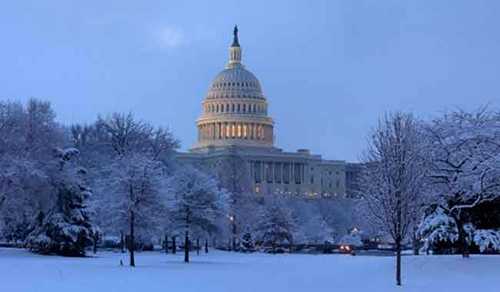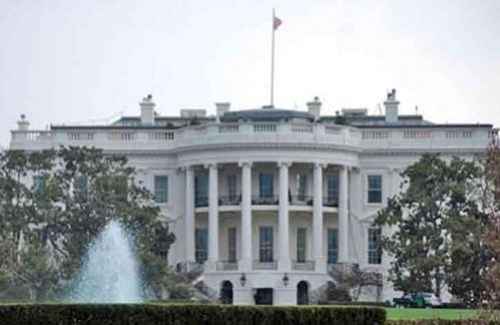“That’s banana republic stuff,” said Rep. Jamie Raskin, a constitutional law expert.

President Donald Trump on Wednesday threatened to adjourn both chambers of Congress so he can unilaterally ram through judges and political appointees amid the coronavirus pandemic, a move Democratic lawmakers and legal experts said would be dictatorial and unconstitutional.
During a press conference in the Rose Garden of the White House Wednesday evening, Trump urged Congress to voluntarily vote to end the current legislative session so he can “recess appoint” nominees without Senate approval. Members of Congress are currently in their home districts and not expected to return to Washington, D.C. until next month at the earliest due to concerns about the spread of Covid-19.
“Donald Trump thinks he’s above the law. Time and again, the Republican justices on the Supreme Court have told him he’s right—enabling his worst impulses.”
—Demand Justice
“If the House will not agree to that adjournment, I will exercise my constitutional authority to adjourn both chambers of Congress,” Trump declared. “The current practice of leaving town while conducting phony pro forma sessions is a dereliction of duty that the American people cannot afford during this crisis. It is a scam what they do.”
The Constitution does give the president the authority to unilaterally adjourn both chambers of Congress, but only “in Case of Disagreement between them, with Respect to the Time of Adjournment.” As Steve Vladeck, a professor at the University of Texas School of Law, pointed out on Twitter, there is no such disagreement at present.
“Article II of the Constitution gives the president the power to adjourn Congress if—and only if—the House and Senate cannot agree on a date for ending the current session,” wrote Vladeck. “But they have agreed—January 3, 2021. There’s a reason why this power has never been exercised before.”
Trump’s threat was immediately condemned by Democratic members of Congress.
Rep. Jamie Raskin (D-Md.), a constitutional law expert and member of the House Judiciary Committee, told the Washington Post Wednesday that “dissolving an assembly comes out of a dictator’s handbook.”
“That’s banana republic stuff,” said Raskin.
Trump’s warning to Congress came after the president had a conversation with Senate Majority Leader Mitch McConnell (R-Ky.) earlier Wednesday in which the two reportedly discussed Senate Democrats’ supposedly “unprecedented obstruction of the president’s well-qualified nominees.”
As Common Dreams reported, Trump and McConnell have not allowed the coronavirus pandemic to hinder their effort to shift the U.S. judiciary further to the right by filling vacancies with disproportionately young and—contrary to the president’s claims—unqualified nominees.
Earlier this month, Trump announced the nomination of U.S. District Judge Justin Walker to the U.S. Court of Appeals for the D.C. Circuit. In late March, the president nominated Mississippi Court of Appeals Judge Cory Wilson to the U.S. Court of Appeals for the Fifth Circuit.
As for nominees to vacant posts within his administration, Trump claimed Wednesday that the positions must be filled to help the White House with its coronavirus response. But as the Post reported, “most of the vacancies in the federal government are because Trump hasn’t selected anyone to fill them.”
Trump said that if Congress doesn’t agree to voluntarily end the current session, he plans to attempt to unilaterally adjourn both chambers and fight it out in the courts.
“They know they’ve been warned and they’ve been warned right now,” said Trump. “If they don’t approve it, then we’re going to go this route and we’ll probably be challenged in court and we’ll see who wins.”
Advocacy group Demand Justice tweeted in response to the president’s remarks that “Donald Trump thinks he’s above the law.”
“Time and again, the Republican justices on the Supreme Court have told him he’s right,” the group said, “enabling his worst impulses.”
Common Dream’s work is licensed under a Creative Commons Attribution-Share Alike 3.0 License. Feel free to republish and share widely.








